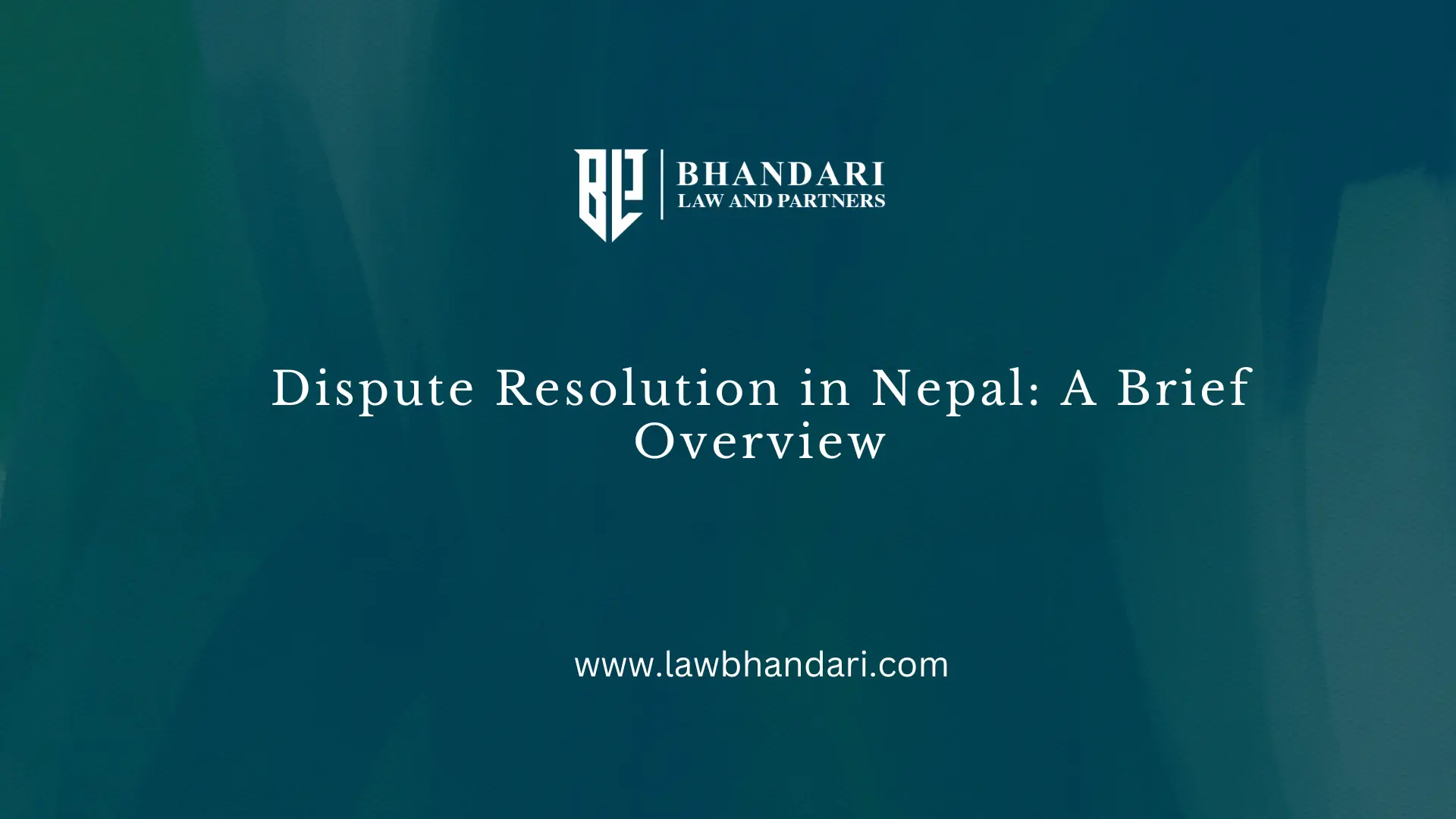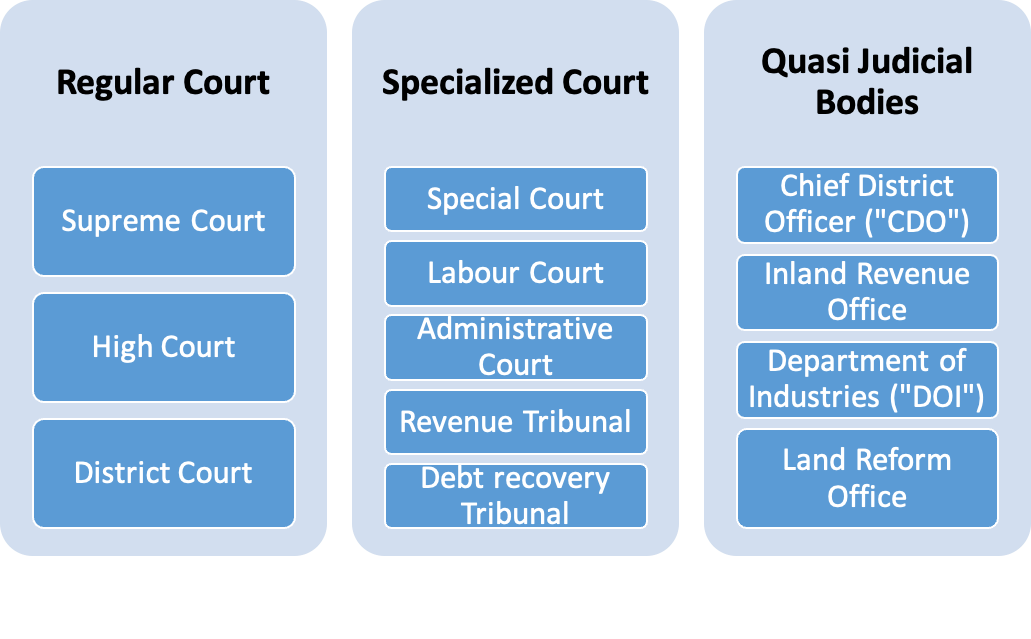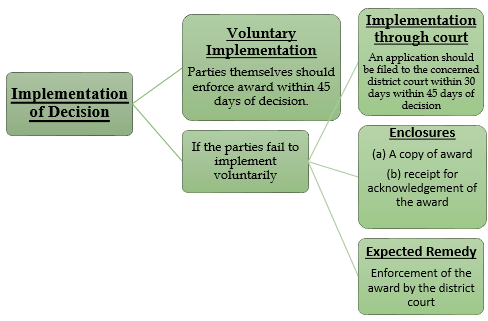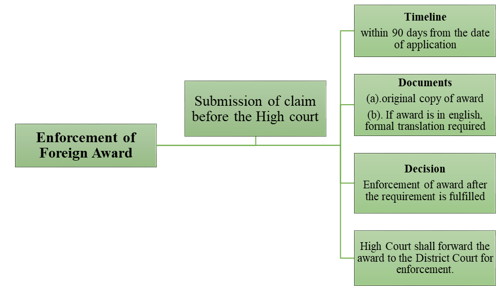Table of content
-

Dispute Resolution in Nepal : A Brief Overview
1. Background on Dispute Resolution in Nepal
Nepalese legal system seems to have adopted both common and civil legal system as the practice of various codified laws and legal precedent prevail in Nepalese legal system. The judicial power is exercised through various courts like the regular courts i.e. District Court, High Court, Supreme Court and through Specialized Courts and quasi-judicial bodies. In addition, mostly commercial disputes are settled through outside the court, Arbitration is the popular dispute settlement mechanism to resolve the disputes on commercial matters outside the court.

Fig: Different Forms of Courts in Nepal
2. Regular Courts in Nepal
The Constitution provides for three tiers of courts in Nepal. The jurisdiction of each level of court has been briefly outlined in the following paragraphs. The Constitution of Nepal, the Administration of Justice Act, 2016 (2073), the Supreme Court Act, 2016 (2073), the Supreme Court Regulations, 2017 (2074), the High Court Regulations, 2016 (2073), District Court Regulation, 2018 (2075) regulates the matter related to the administration of justice by the regular courts.
2.1. District Court
There are 77 District Courts in Nepal one in each District. The District Court consists of one or more Single Bench and each District Court is composed of at least one Judge and other Judges may be appointed as required.
The District Court acts primarily as the court of first instance which hears appeal on certain matters decided by the judicial or quasi-judicial body. The District Court has also been given writ jurisdiction on limited matters. The jurisdiction of the District Court is briefly outlined as below:
| Ordinary Jurisdiction | Extra-Ordinary Jurisdiction | |
|---|---|---|
| Original | Work as the court of first instance; it hears all the cases within its Territorial jurisdiction. | Hears appeal on the final decision made by Quasi-judicial bodies or government authorities under its jurisdiction. |
| Appeal | ||
| Writ Jurisdiction | It has the power to hear habeas corpus or injunctive petition on the matters related to its territorial Jurisdiction. |
2.2. High Court
There is one High Court in each State. There are seven High Courts and the courts have extended benches in eighteen major cities of the provinces.
The High Court can exercise both the ordinary jurisdiction and extra-ordinary jurisdiction. The jurisdiction is briefly outlined in the table below:
| Ordinary Jurisdiction | Extra Ordinary Jurisdiction | |
|---|---|---|
| Original | Cases specified in the Federal Law which authorize High Court as the court of first instance. | Hears appeal of the cases in which the District Court within its territorial jurisdiction has partially or fully reversed the decision of the judicial or quasi-judicial body or authority. |
| Appeal | Hears appeal against the judgment or final orders given by the District Court within its Territorial jurisdiction. | Issue writs of habeas corpus, mandamus, certiorari, Prohibition, injunction, and quo-warranto. Cases called from the District Court within its territorial jurisdiction considering the seriousness of the matter involved. |
2.3. Supreme Court
The Supreme Court is the apex/highest court in Nepal which is also the court of record. The decision given by the Supreme Court is binding to all. All other courts whether regular or specialized including other judicial bodies are under the Supreme Court and the Supreme Court can exercise its supervisory, monitoring authority. Supreme Court forms different courts/benches such as (a) Single Bench (with single judge), (b) Division Bench (with two judges), (c) Full Bench (with three judges), (d) Extended Full Bench (with five or more judges), (e) Constitutional Bench (with five judges) depending upon the nature of matter.
Generally, the initial or preliminary hearing is referred to the Single Bench and the Final hearing is to the Division Bench. However, initial hearing on appeal is heard by the Division Bench. The Full Bench or Extended Full Bench hears such matter which is more serious in nature or in which the opinion of judges differ or the judges differ their opinion from the previous judgment. The Constitution Court hears the constitutional disputes.
The Supreme Court is entrusted with different powers under the Constitution of Nepal which includes the administrative or law making power as well as judicial power. The judicial power has been briefly outlined in the table below:
| Ordinary Jurisdiction | Extraordinary Jurisdiction | |
|---|---|---|
| Original | Contempt of the court/s | Hears appeal on the cases originally tried and settled by High Court |
| Appeal | Hears appeal on the cases in which punishment of imprisonment for ten or more years has been imposed by High Court | Hears the revision petition against the decision or final order rendered by High Court in absence for the right to appeal |
| Review/Revision | Examines the constitutionality of any laws and declares ultra-vires if it contradicts with the Constitution | Reviews its own decision on few grounds defined by the law. Issues necessary and appropriate orders to enforce fundamental rights or legal rights for which no other remedy is available or such remedy is not adequate. |
| Cases specified in the Federal Law | Hears appeal on the cases in which the District Court has been reversed partially or fully by the High Court. | |
| Issues writs of habeas corpus, mandamus, certiorari, prohibition, injunction, and quo-warranto. |
3. Specialized Court
Various other courts exercise special jurisdiction except the regular Courts which are called Specialized Courts. Such Court hears the specific nature of cases. Some of the types of specialized Courts are as mentioned:
3.1. Special Court
The Special Court in Nepal operates under the Special Court Act, 2059 (2002), primarily focusing on cases associated with corruption. Special court consists of a panel of at least three judges. Its main function is to hear and adjudicate cases specifically related to corruption, aiming to address and resolve such matters within the legal framework outlined by the Special Court Act, enacted in 2059(2002).
3.2. Administrative Court
The Administrative Court is formed pursuant to Section 3 of Administrative Court Act, 2019 (2076). The court shall be located in Kathmandu and shall exercise the jurisdiction from all over Nepal. The court hears the appeal against the departmental actions and punishment awarded to civil servants.
3.3. Revenue Tribunal
The Revenue Tribunal Act, 1974 (2031) provides for the formation and function, among other things, of the Revenue Tribunal. The Tribunal consists of three members (i) Law Member, (ii) Revenue Member and (iii) Account Member. The Revenue Tribunal hears the appeal on revenue related matters such as matters related to Income Tax, Value Added Tax, Customs Duty, Excise Duty etc. Generally, the taxpayer files appeal before the Revenue Tribunal challenging the re-assessment of tax made by the tax authorities. The appeal is subject to the special leave granted by the Supreme Court. The Supreme Court grants appeal if there is (a) error on jurisdiction, (b) error on examination of evidence and (c) error on law or procedure.
3.4 Debt Recovery Tribunal
Debt Recovery Tribunal is established pursuant to Section 3(1) of the Recovery of Debts of Banks and Financial Institutions Act, 2059 (" Debt Recovery Act") with the object of originally trying and settling the cases related to recovery of debts of bank and financial institutions . The formation of the Debt Recovery Tribunal is similar to that of the Revenue Tribunal. There has been also Debt Recovery Appellate Tribunal to hear appeal against the decisions made by the Debt Recovery Tribunal.
3.5. Labor Court
The Labor Act, 2017 (2074) ("Labor Act") provides for the formation of the Labor Court. It is composed of a chairperson and two other members. The Labor Court has the jurisdiction to hear the employment matters such as dismissal of the employee etc. The Labor Court has the power to act as court of first instance as well as the appeal court on the matters decided by the Labor Office and Labor Department.
4. Quasi-Judicial Body
Beside the regular court and specialized court there has been other quasi-judicial bodies which also exercise judicial powers in Nepal. However the Quasi- Judicial Authorities are not authorized to hear the criminal cases in which the term of imprisonment exceeds one year. Some of the quasi-judicial bodies which generally exercise judicial power are briefly discussed in the following paragraphs.
4.1. Chief District Officer (CDO)
As per the section 5 of the Local Administration Act, 1971 (2028) CDO can exercise certain judicial powers on certain petty offences such as (i) minor theft having claim up to Five Hundred Rupees, (ii) pick-pocketing, (iii) use of inaccurate weights and measurements for deception, (iv) slaughtering of female animals at places other than temples where it is a customary practice, (v) black marketing offence, (vi) sexual harassment at workplace etc.
4.2 Land Revenue Officer (LRO)
The Land Revenue Act, 1978 (2034) provides the provision of the LRO in each district of Nepal. The Land Revenue Office has the power to hear certain matters relating to the ownership of land as well as the impose fine and punishment in the case of violation of provisions of the Land Act.
4.3. Department of Land Management
The Department of Land Management is the sole entity under the Government of Nepal (GoN) responsible for undertaking land reforms and administering land management functions. Its nationwide presence is facilitated through district land revenue offices, commonly known as Malpot. The department serves as the arbitrator and safeguard for land ownership and tenancy rights, functioning as the keeper of land ownership records. Additionally, it acts as the organ for the collection of revenue and serves as the administrator for land management.
4.4. Department of Industry
The Department of Industry, situated within the Ministry of Industry, stands as a key agency entrusted with the implementation of policies, acts, rules, and regulations concerning industrial development. It plays a crucial role in the Government of Nepal's plan to strengthen the Nepalese economy. The department act in relation to industrial administration including industry registrations and provide licenses to industries requiring licensing. It also act as a quasi-judicial body for industrial intellectual property.
5. Settlement of Dispute through Arbitration
Expect dispute settlement through court, dispute can be settled through outside the court. Arbitration is a method by which the dispute is resolved outside the Court. The below mentioned paragraph explains regarding settlement of dispute through arbitration.
5.1 Arbitration
Arbitration Act, 2055(1999) and Arbitration Rules, 2059(2003) are the principle laws governing arbitration in Nepal.
Further, Nepal is the party to the CONVENTION ON THE RECOGNITION AND ENFORCEMENT OF FOREIGN ARBITRL AWARD also known as New York Convention, 1958 having assessed to the convention on March 4, 1998.
Nepalese Arbitration Law seems to have been influenced by the UNCITRAL Model Law, as some provisions in Nepalese Arbitration Act were borrowed from UNCITRAL Law.
5.2. Condition of settlement of dispute through Arbitration
Party should initiate the arbitration if;
a. The agreement compromises arbitration clause as the way of settlement of dispute,
b. The parties agree to settle dispute through arbitration mutually and
c. If parties can initiate the arbitration in between the court case proceeding on mutual consent.
5.3. Proceeding of Arbitration
Arbitration proceeding is initiated once the parties to the arbitration agree to arbitrate and the parties are given the exclusive right to choose the arbitrator. Process of arbitration and the timeline required for it is as mentioned:
| Process | Timeline |
|---|---|
| Appointment of an arbitrator | 3 months from the date of beginning Arbitration Proceeding |
| Submission of Claim | 3 months from the date of initiation of Arbitration Proceeding |
| Submission of Counter Claim | 30 days from the date of receipt of claim (shall be as per agreement if already mentioned) (additional 15 days can be extended upon certain conditions) |
| Rejoinder | 15 days (can be extended up to 15 days upon certain conditions like a situation out of control) |
| Award to be pronounced | Arbitrator shall pronounce the decision within 120 days from the date of submission of Documents |
| Implementation of Award | 45 days from the date after receiving the copy of Award |
| Additional time for implementation of Award | 30 days from the date of expiry of the time limit prescribed for the implementation of Award |
| Implementation by District Court | 30 days after the petition for implementation is filed |
For more detail understanding on procedure of arbitration, you can check the article on HIGHLIGHTS OF ARBITRATION ACT OF NEPAL published by the law frirm.
5.4 Enforcement of Arbitration award
After receiving the copies of the decision after the arbitration process, the award should be enforced by the parties voluntarily within 45 days. In case an award is not enforced within 30 days from the expiry of time limit, the court should enforce the award within 30 days as its judgment.
5.4.1. Enforcement of Domestic Award
Domestic Award is implemented after the party receives a copy of the award. Once the award is provided to the parties, they should enforce it within 45 days after receiving the copy of award. The process for enforcement of domestic award in Nepal is as mentioned:

Figure Explaining Detail Process of Implementation of Domestic Arbitral Award
5.4.3. Enforcement of Foreign Award
Any party willing to implement an arbitral award in Nepal made in a foreign country should submit an application to the High Court along with:
a. Original copy of the arbitral award,
b. The original or certified copy of the agreement,
c. If the award is in any other language than the award should be translated into official Nepali language.

Figure: Explaining Detail Process of Enforcement of Arbitration Award
6. Enforcement of Foreign Court Judgment
The Mutual Legal Assistance Act, 2014 (2070) or MULA is the primary law in Nepal that regulates the process of providing and obtaining legal assistance between Nepal and foreign countries on specific legal matters. One significant aspect of this act is outlined in Section 5, which allows the Nepalese government and foreign nations to request for enforcing foreign judgments. Section 3 specifically mandates a bilateral treaty as a necessary condition for enforcing a foreign judgment in Nepal. This means that while legal assistance can typically be provided on the basis of bilateral agreements or reciprocity, the enforcement of foreign judgments in Nepal is contingent upon the existence of a specific bilateral treaty between Nepal and the foreign country in question.
Section 37 of the Mutual Legal Assistance Act (MULA) outlines criteria for the enforcement of foreign judgments in Nepal. It stipulates that for a foreign judgment to be enforced, following conditions must be met:
a) The judgment must be issued by a court with proper jurisdiction (competent court).
b) The judgment must be enforceable in the specific foreign country.
c) The judgment should be final and not subject to further review within the foreign country's legal system.
7. Compulsion obligation to initiate arbitration
Generally, the parties to the contract are free to choose the dispute settlement mechanism except certain nature of disputes or contracts. However, some acts has specifically prescribed regarding the initiation of arbitration proceeding for the settlement of dispute. Those acts are as mentioned.
7.1. Public Procurement Act
Section 58 of the Public Procurement Act provides the mechanism for dispute settlement. The Section 58 of the Public Procurement Act provides that any procurement disputes between public entity and the contractor under construction contract or the service supplier or consultant which is not settled amicably should be settled in accordance with the contract. However, dispute settlement mechanism in the contract should provide that the dispute should be settled by arbitration in accordance with the prevailing laws of Nepal.
There has been no set practice for the choice of law governing contracts or dispute settlement mechanism in practice. If we look into the Public Procurement Act for instance, the different Public Procurement Act provides for different governing law and dispute settlement mechanisms. Some provide that the dispute should be referred to arbitration to be held in Kathmandu under UNCITRAL Rules which is governed by the laws of Nepal, some provide the dispute should be referred to arbitration as per the UNCITRAL Rules to be held in Singapore as per the laws of Nepal, and some provide that the dispute should be settled through arbitration to be held in Nepal in accordance with the laws of Nepal.
The Laws of Nepal do not restrict to choose the governing laws except the FITTA and the Public Procurement Act. However, there is no such Precedent in Nepal which refers that the foreign law is possible in disputes.
7.2 Foreign Investment and Technology Transfer Act ("FITTA")
Section 40 of FITTA has provided the settlement of dispute through negotiation. If the parties to the dispute fails to settle the dispute via negotiation within 45 days, the dispute shall be settled as mentioned in the agreement between the parties (if any). However, if the agreement is silent regarding the settlement of dispute, dispute shall be resolved by the means of arbitration in accordance with the law on arbitration of Nepal.
7.3. Public, Private Partnership Act, 2075 ("PPPA")
Section 40 of the PPPA has provided party autonomy for the settlement of dispute. However, if the parties fail to settle dispute within themselves, PPPA has provided that the dispute to be settled as per the procedure mentioned in the Contract. If the parties to the contract has not mentioned regarding the mechanism for settlement of dispute in the contract, the act has provided arbitration as the mechanism of dispute settlement.
Date of Publication: 20 Janurary 2024
Disclaimer: This article published on our website of Bhandari Law and Partners one of the leading law firm in Nepal, is just for information purposes only. It shall not be taken as legal advice, advertisement, personal communication, solicitation, or inducement. Bhandari Law and Partners or any of the team members of the firm shall not be liable for the consequence arising from the information provided. As the factual situation may be different in your case, thereof if you need further legal advice on the subject matter, please Contact Us .
Related Professionals:
Frequently Asked Question
For quick legal assistance:
You can directly call to our legal expert: +977-9808811027
Even can call or drop a text through What’s app , Viber, Telegram and We Chat at the same number.
Also can do email on : info@lawbhandari.com
contact us
Phone :,
,Connect with our professional lawyers in Nepal :
Follow Our Law Firm on Social Media :